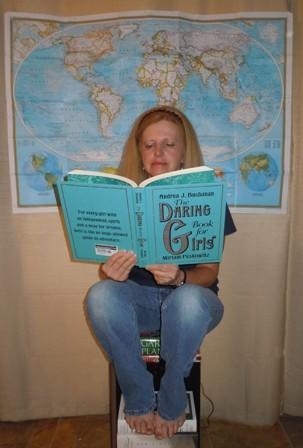Cheryl Hughes: Wolf At The Door
Many times in my life, I’ve found myself interacting with Calamity Jane-type women—independent, self-sufficient, don’t-tell-me-I-can’t-do-that sorts. I’ve always been a bit hesitant and somewhat shy, so I figure it’s God’s way of nudging me forward. These women aren’t necessarily feminists, they’re more like pioneers. Most, I believe, were born that way, and the ones who weren’t, were molded by their circumstances.
My stepmom was handling a team of mules by her early teens. She grew up on a hard-scrabble farm that forced her to acquire survival skills. Self-confidence was a natural byproduct. That self-confidence spilled over into other areas of her life. She helped my dad at the sawmill, turning posts and often driving the big log truck.
The era in which my stepmom grew up, and the one shortly before, produced many such women. Their families were poor, they didn’t have the resources or the time to coddle their girls. The book, Half Broke Horses, is about a woman like that. Her name was Lily Casey. She was the grandmother of Jeannette Walls, author of Glass Castle. When Lily was fifteen, she set out on a horse to ride 500 miles by herself in order to take a job as a substitute teacher. She had grown up on a ranch, breaking horses and raising cattle and building confidence in her own ability to take care of herself. It is amazing to me that her parents barely blinked at the notion of Lily taking on the challenge. They fully expected her to be able to do it.
There are other stories like hers, stories about women who lived right here in Butler County. My friend, Donna Meir, comes from such women. Her great-grandmother, Dora Smith, and Dora’s sister, Mary Cherry, struck out for St. Louis when they were young girls. They were both excellent seamstresses, so they opened a dress shop in the city. Mary contracted polio as an infant and walked with a cane all of her life, but never allowed the affliction to slow her down. She had clients from all across the U.S., and was able to make the first donation toward building the Methodist Church in Morgantown from her earnings. She also served as the first president of the women’s society in that same church.
My friend, Mattie, who lived in this county for several years, grew up on a farm in Georgia during the 1920’s and ‘30’s. She developed a degenerative bone disease at an early age and spent most of her youth caring for younger siblings. Each time her mother had a baby, she would take the infant and place her in Mattie’s arms and say, “You have a new little one.” Because of Mattie’s affliction and the problems it often caused her parents, she was forced into an early marriage with an older man when she was barely in her teens. The marriage proved disastrous, but the union produced a son whom Mattie adored.
She was determined to carve out a better life for herself and her son, and a few years later, she was in Chicago training to become a re-weaver, repairing small holes in expensive garments. She married again, and she and husband, Art, ran their own successful business in the city until they retired to Butler County.
I believe women like Lily and Mary and Mattie and my stepmom accomplished the things they did because they were forward-thinking women. They had little time to look back and re-think anything. The people they grew up with and around were in the same boat. They didn’t have time for low self-esteem. The wolf was at the door and any stragglers would be picked off. Adverse circumstances became training tools, not excuses for failure.
It is a different world in which we live, one brimming with opportunity. We have financial aid, training exercises, advanced degrees, motivational speakers and Oprah to push us forward. The ironic thing is that often when people are presented with countless choices, they are unable to choose and opportunity becomes the real challenge.
(There is an exhibit on the life of Mary Cherry at the Green River Museum in Woodbury. The museum is open on Saturdays, and there will be an antique tractor show and craft fair on the museum grounds on Saturday, June 21st.)
- Log in to post comments



























